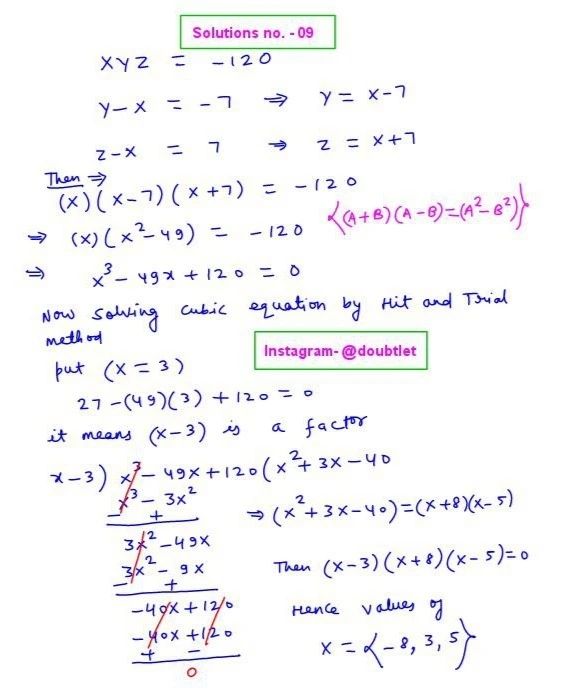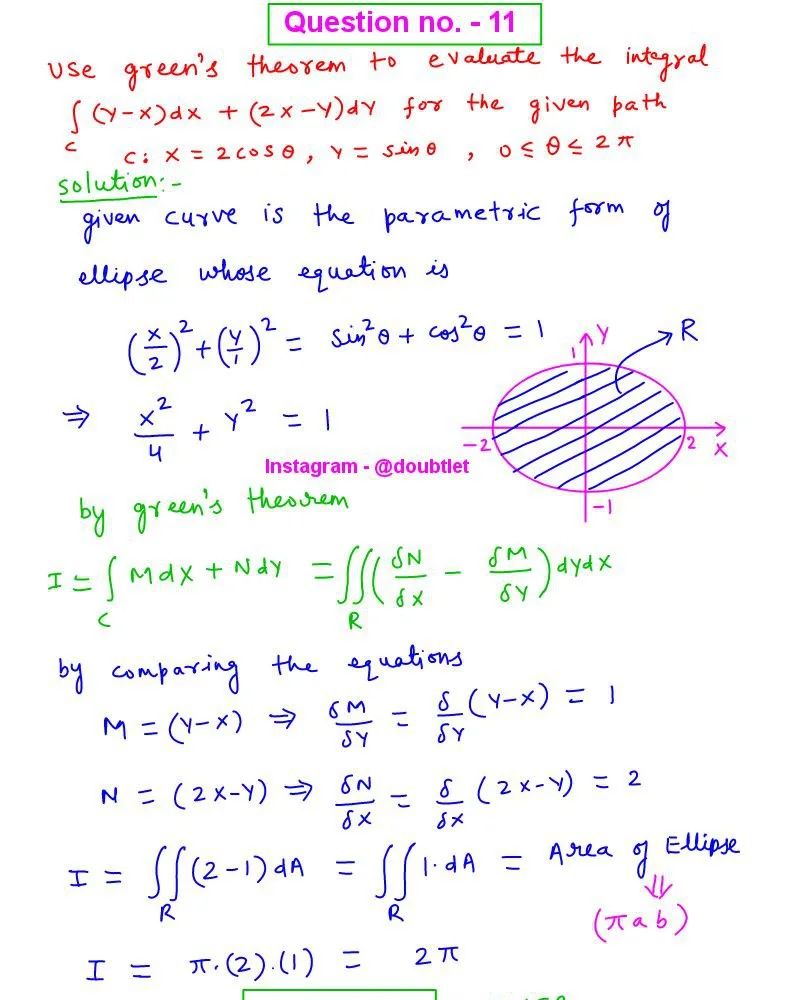Neetesh Kumar | November 10, 2024
Calculus Homework Help
This is the solution to Math 1D Assignment: 16.7 Question Number 3 Contact me if you need help with Homework, Assignments, Tutoring Sessions, or Exams for STEM subjects. Testimonials or Vouches from here of the previous works I have done.
Get Homework Help
Step-by-step solution:
To evaluate the surface integral ∬ S y z d S \iint_S yz \, dS ∬ S yz d S S S S d S dS d S d x dx d x d y dy d y
Step 1: Find the Equation of the Plane
The equation of the plane is given by:
x + y + z = 4 x + y + z = 4 x + y + z = 4 z z z x x x y y y z = 4 − x − y z = 4 - x - y z = 4 − x − y
Step 2: Set Up the Surface Element d S dS d S
The surface element d S dS d S z = f ( x , y ) z = f(x, y) z = f ( x , y ) d S = ( ∂ z ∂ x ) 2 + ( ∂ z ∂ y ) 2 + 1 d x d y dS = \sqrt{\left( \frac{\partial z}{\partial x} \right)^2 + \left( \frac{\partial z}{\partial y} \right)^2 + 1} \, dx \, dy d S = ( ∂ x ∂ z ) 2 + ( ∂ y ∂ z ) 2 + 1 d x d y
Calculate ∂ z ∂ x \frac{\partial z}{\partial x} ∂ x ∂ z ∂ z ∂ y \frac{\partial z}{\partial y} ∂ y ∂ z
∂ z ∂ x = − 1 \frac{\partial z}{\partial x} = -1 ∂ x ∂ z = − 1 ∂ z ∂ y = − 1 \frac{\partial z}{\partial y} = -1 ∂ y ∂ z = − 1
Thus,
d S = ( − 1 ) 2 + ( − 1 ) 2 + 1 d x d y = 3 d x d y dS = \sqrt{(-1)^2 + (-1)^2 + 1} \, dx \, dy = \sqrt{3} \, dx \, dy d S = ( − 1 ) 2 + ( − 1 ) 2 + 1 d x d y = 3 d x d y
Step 3: Set Up the Integral
Now we can express the integral as:
∬ S y z d S = ∬ D y ( 4 − x − y ) 3 d x d y \iint_S yz \, dS = \iint_D y(4 - x - y) \sqrt{3} \, dx \, dy ∬ S yz d S = ∬ D y ( 4 − x − y ) 3 d x d y
where D D D S S S x y xy x y ( 4 , 0 ) (4, 0) ( 4 , 0 ) ( 0 , 4 ) (0, 4) ( 0 , 4 ) ( 0 , 0 ) (0, 0) ( 0 , 0 )
Step 4: Set Up the Limits of Integration
For the triangular region D D D x y xy x y
x x x 0 0 0 4 4 4 For a given x x x y y y 0 0 0 4 − x 4 - x 4 − x
Thus, the integral becomes:
∬ S y z d S = 3 ∫ 0 4 ∫ 0 4 − x y ( 4 − x − y ) d y d x \iint_S yz \, dS = \sqrt{3} \int_0^4 \int_0^{4 - x} y(4 - x - y) \, dy \, dx ∬ S yz d S = 3 ∫ 0 4 ∫ 0 4 − x y ( 4 − x − y ) d y d x
Step 5: Evaluate the Integral
Integrate with respect to y y y ∫ 0 4 − x y ( 4 − x − y ) d y = ∫ 0 4 − x ( 4 y − x y − y 2 ) d y \int_0^{4 - x} y(4 - x - y) \, dy = \int_0^{4 - x} (4y - xy - y^2) \, dy ∫ 0 4 − x y ( 4 − x − y ) d y = ∫ 0 4 − x ( 4 y − x y − y 2 ) d y
Break it down term by term:
∫ 0 4 − x 4 y d y = 4 ⋅ ( 4 − x ) 2 2 = 2 ( 4 − x ) 2 \int_0^{4 - x} 4y \, dy = 4 \cdot \frac{(4 - x)^2}{2} = 2(4 - x)^2 ∫ 0 4 − x 4 y d y = 4 ⋅ 2 ( 4 − x ) 2 = 2 ( 4 − x ) 2 ∫ 0 4 − x x y d y = x ⋅ ( 4 − x ) 2 2 = x ( 4 − x ) 2 2 \int_0^{4 - x} xy \, dy = x \cdot \frac{(4 - x)^2}{2} = \frac{x(4 - x)^2}{2} ∫ 0 4 − x x y d y = x ⋅ 2 ( 4 − x ) 2 = 2 x ( 4 − x ) 2 ∫ 0 4 − x y 2 d y = ( 4 − x ) 3 3 \int_0^{4 - x} y^2 \, dy = \frac{(4 - x)^3}{3} ∫ 0 4 − x y 2 d y = 3 ( 4 − x ) 3
Putting these together:
∫ 0 4 − x y ( 4 − x − y ) d y = 2 ( 4 − x ) 2 − x ( 4 − x ) 2 2 − ( 4 − x ) 3 3 \int_0^{4 - x} y(4 - x - y) \, dy = 2(4 - x)^2 - \frac{x(4 - x)^2}{2} - \frac{(4 - x)^3}{3} ∫ 0 4 − x y ( 4 − x − y ) d y = 2 ( 4 − x ) 2 − 2 x ( 4 − x ) 2 − 3 ( 4 − x ) 3
Integrate with respect to x x x 0 0 0 4 4 4
∬ S y z d S = 3 ∫ 0 4 ( 2 ( 4 − x ) 2 − x ( 4 − x ) 2 2 − ( 4 − x ) 3 3 ) d x = 32 3 \iint_S yz \, dS = \sqrt{3} \int_0^4 \left( 2(4 - x)^2 - \frac{x(4 - x)^2}{2} - \frac{(4 - x)^3}{3} \right) dx = \dfrac{32}{\sqrt{3}} ∬ S yz d S = 3 ∫ 0 4 ( 2 ( 4 − x ) 2 − 2 x ( 4 − x ) 2 − 3 ( 4 − x ) 3 ) d x = 3 32
Final Answer:
∬ S y z d S = 32 3 \iint_S yz \, dS = \boxed{\dfrac{32}{\sqrt{3}}} ∬ S yz d S = 3 32
Please comment below if you find any error in this solution.
If this solution helps, then please share this with your friends.
Please subscribe to my
Youtube channel for video solutions to similar questions.
Keep Smiling :-)















Leave a comment